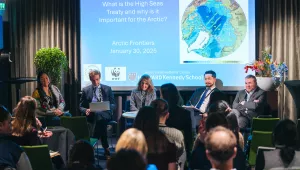Abstract
Deforestation in the tropics is proceeding rapidly. It is in the interest of the United States Government to implement policies for improved management of tropical forests. The most effective approach is through development aid. The Agency for International Development (AID) lacks the technical resources with which to adequately address the problems of tropical forestry, though the Agency does have access to an extensive network of experts in the private sector. The Department of Agriculture, including the Forest Service, has ample technical resources, and these could be used to greater advantage in support of AID. However, the Department perceives its mission as domestic and is reluctant to participate in programs for international development. In addition to this organizational segregation of responsibility and resources, historical and conceptual obstacles to the policymaking process exist. In the United States, farmers and foresters have usually (mis)pierceived their activities as unrelated. Additionally, in the forestry community, researchers and practitioners have been slow to integrate traditional conservation techniques with ecological science. Both cleavages impede the formulation of international forestry policy, as shifting farmers do most of the damage to tropical forests, the ecology of which is exceedingly complex.
For full text please see PDF below (login may be required).
Stowe, Robert. “United States Foreign Policy and the Conservation of Natural Resources: the case of tropical deforestation.” Natural Resources Journal, Winter 1987





